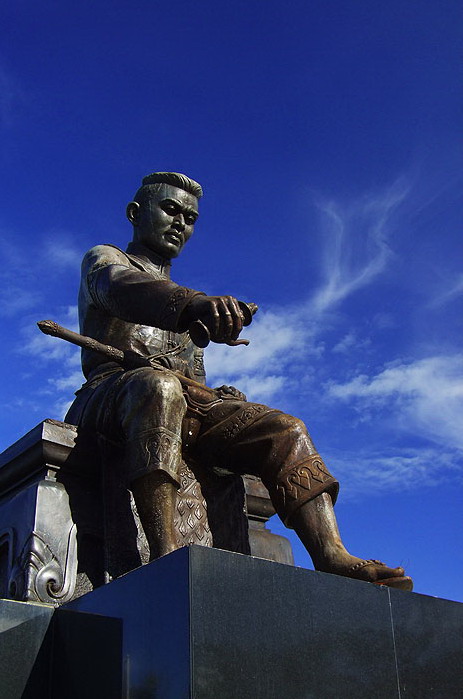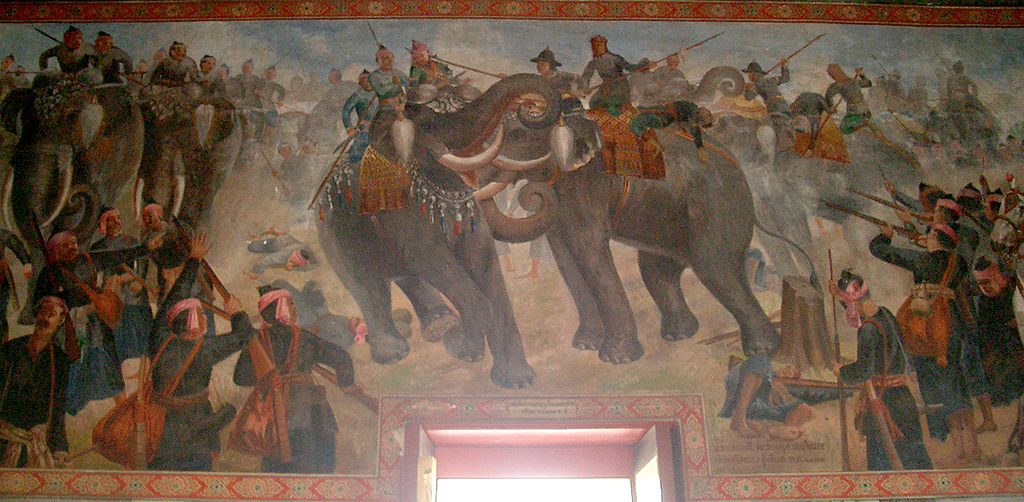![Wanchana Sawatdee as King Naresuan in film The Legend of Naresuan. [PHOTO: cineplex,media.com]](https://historythings.com/wp-content/uploads/2016/09/180083_full.jpg)
This time, we’re talking about Prince Naret, later called Naresuan, also known as “The Black Prince” of Thailand, the country’s national hero. As if that wasn’t a mouthful in of itself, he managed to win Thailand’s independence from Burma by defeating the Burmese king in a sword duel fought from the back of an elephant.
Early Life

Naresuan’s life was characterized by the rivalry between Burma and Thailand – then called Siam. He was born on April 25th, 1555, son of the king of Siam. He had one brother, known as the “White Prince”, and one sister.
In 1563, when Naresuan was just eight, the king of Burma invaded Thailand and lay siege to the capital. The city was unable to withstand the siege, and so Naresuan’s father surrendered. The Burmese king turned Thailand into a tributary state and took Naresuan as a political hostage to ensure his father would not rebel.
Naresuan’s childhood at the Burmese court was not a happy one. He was tormented by the young Burmese prince, who happened to be about the same age as him. The two had a raging rivalry. But despite that, Naresuan was determined to restore Thailand back to independence, and was a very focused child. He spent his childhood studying up on tactics from Burma’s generals and learning martial arts. It was said of him that he studied alongside the “elite of Burmese youth, sons of princes and nobles. Besides being gifted in military prowess, Naresuan, who was highly intelligent, gained a great deal of general knowledge of the times.”
Six years later, Naresuan was exchanged for his sister. The king took her as his second wife and sent Naresuan to serve as crowned prince of Siam. It was a title that held very little real power. Yet, Naresuan was called upon to help Burma conquer the Khmer Empire. It was here, when he was sixteen, that he got his first taste of real war experience, and he did not disappoint.
Once, after several failed frontal assaults on a powerful Khmer fortress, Naresuan took it upon himself to scale a sheer cliff straight up, sneak into the castle, kill all of the defending soldiers (or knock them unconscious), and open the gates for the Burmese soldiers.
In 1583, by the time Naresuan was almost thirty years old, he had become extremely popular in Burma. The king was actually afraid of him, so he naturally sent assassins to try and kill the little upstart Siamese prince. However, Naresuan became aware of the plot, defeated the assassins and ran away.
Naresuan fled to his home country, planning to martial support for himself. The time had finally come, it seemed, to set Thailand free. Even though an army showed up to try and stop his crossing the border, Naresuan was undaunted. He shot the commander in the head and continued on to Thailand.
Liberation of Thailand
That same year, Naresuan reached the capital of Thailand and declared independence as soon as he did by “[pouring] water on the earth from a gold goblet to proclaim to the devatas in the presence of the persons assembled, that from that day forth Siam had severed friendship with [Burma] and was no longer in amity as of yore.” He then levied the Mons to join his campaign and marched on Bago and freed 10,000 Siamese families there.
![King Naresuan entering Bago [PHOTO: wikimedia]](https://historythings.com/wp-content/uploads/2016/09/Kns006.jpg)
That same year, the king of Burma sent two separate armies to try and quell the Thai rebellion. Both were defeated. Then, later in 1585, Naresuan captured a third Burmese army comprising of 10,000 soldiers, 120 elephants, 100 horses, and 400 boats.
They tried a fourth time in 1586, led by the King of Burma himself. They laid siege to the Thai capital for five months, but Naresuan so aggressively defended it that the Burmese had to retreat and go home.
In 1590, Naresuan’s father died and he was crowned king of Thailand. The Burmese army desperately tried a fifth time to invade Thailand and take it back, but Naresuan battled them away. He had crushed five separate invasions in six years. It seemed he would not be stopped.
The Elephant Battle

In 1592, Naresuan’s childhood rival, the prince of Burma, was now king. With his newfound power and old vendetta against our hero still roiling, he gathered his forces and invaded to try and take Thailand back once and for all. Ten thousand soldiers marched on Thailand. The ensuing battle did not go well for Naresuan. The Thai are hard-pressed and losing ground fast. They were outmatched and outgunned, overwhelmed by the Burmese numbers. It seemed as if Burma would finally win Thailand back and the country would, yet again, be under the thumb of a foreign empire.
Naresuan wasn’t about to let that happen. Just when all hope was lost, he charged through the battle on the back of a raging bull elephant. The new king of Burma was also riding an elephant – and neither him nor Naresuan were about to relinquish their advantage. The two clashed elephants in a flurry of trunks and tusks, and then leaped to the animals’ heads and drew their swords.
The story goes that, in the next few minutes, even the two armies stopped their fighting to watch the spectacle. The two kings duked it out from atop the heads of their elephants, knowing that just one false step would mean death, either by their opponent’s sword or by trampling.
Finally, after several minutes of back-and-forth, Naresuan landed the final, crushing blow. He cut the Burmese king entirely in half, severing the right half of his body from his left shoulder and leg.
Not knowing what to do with that, the Burmese army was so frightened that they turned tail and retreated home. After years and years of war, in one decisive elephant battle, Thailand was finally free.
Later Life and Death
Naresuan’s sword and helmet still exist today. He built a pagoda on the site of the elephant battle to commemorate his victory, and even after that, he wasn’t done.
Naresuan went on to conquer Cambodia, reunite Thailand, and even invaded Burma for good measure and took a few cities away from them. Unfortunately, he had a rather inauspicious death, dying of sepsis at the age of 50 in 1605.
Now, King Naresuan is immortalized as the national hero of Thailand, and every January, they celebrate their national holiday – Elephant Duel Day – in his honor.